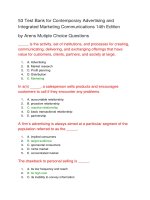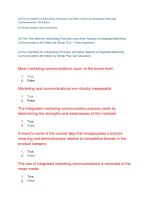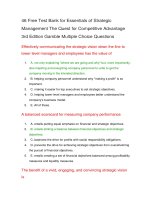Test bank for leadership roles and management functions in nursing, 8e
Bạn đang xem bản rút gọn của tài liệu. Xem và tải ngay bản đầy đủ của tài liệu tại đây (106.52 KB, 10 trang )
full file at
1. What concept is servant leadership based upon?
A) Trusting and valuing employees
B) Genuinely liking your colleagues
C) A laissez-faire style of leadership
D) A dynamic leadership charisma
Ans: A
Feedback:
These managers, termed servant leaders, put serving others, including employees,
customers, and the community, as the number-one priority. In addition, servant leaders
foster a service inclination in others that promotes collaboration, teamwork, and
collective activism. The servant leader is not necessarily associated with the concepts
identified in the other options.
2. What is the critical leadership skill when attempting to build a cooperative and effective
team?
A) Showing their true feelings
B) Empathizing with followers
C) Identifying existing emotions in themselves and others
D) Manipulating the emotions of all involved to achieve stated goals
Ans: C
Feedback:
Theorists studying emotional intelligence posit that the ability to identify emotions in
themselves and in others is a critical ingredient of leaders, enabling them to build a
cooperative and effective team. While the other options may have value, they do not
represent the critical skill related to team building.
3. Which principle will help increase the likelihood that followers do not mislead their
leader?
A) Support the followers' right to disagree
B) Rely only on facts and discount intuition
C) Discourage acceptance until the facts are proved
D) Identify who to rely upon and who not to listen to
Ans: A
Feedback:
There is no guarantee that followers will not mislead leaders, but adhering to certain
principles, such as making sure that followers are allowed to disagree, will guard against
this happening. The remaining options are flawed in the principles they support.
Page 1
full file at
4. Which statement regarding the characteristics of a good leader is true?
A) They are totally trustworthy
B) They may have character flaws
C) They are by nature good intentioned
D) Charisma is their strongest attribute
Ans: B
Feedback:
Leaders may be deceitful and trustworthy, greedy and generous, and cowardly and
brave. To assume that all good leaders are good people is foolhardy and makes us blind
to the human condition. It is only when we recognize and manage our failings that
leaders achieve greatness.
5. To decrease overtime, the manager of a surgical unit offers nurses who get their work
finished on time for an entire 2-month period an extra day off with pay at regular time.
What is this an example of?
A) Bribing nurses
B) Quantum leadership
C) Principal agent theory
D) Servant leadership
Ans: C
Feedback:
Principal agent theory suggests that followers may have an informational (expertise or
knowledge) advantage over the leader as well as their own preferences, which may
deviate from that of the principal. This may lead to a misalignment of goals. To
influence the agent, the principal offers an incentive that corrects excessive overtime.
The remaining options do not represent the example offered.
6. Which statement concerning nursing leadership functioning at its potential is true?
A) The leadership role is most important in nursing today
B) Leadership is most important in managing health-care costs
C) The most important nursing leadership role is being charismatic
D) There is a need to integrate nursing management and nursing leadership
Ans: D
Feedback:
For managers and leaders to function at their greatest potential, the two roles must be
integrated. The other statements are not true.
Page 2
full file at
7. What is the conclusion of interactional theories regarding successful leadership?
A) Leaders, followers, and the situation were all variables that interacted
B) The situation had the most profound effect on success in leadership
C) The situation has a greater effect on outcomes than followers do
D) Good results would occur if leaders led well
Ans: A
Feedback:
The successful leader will diagnose the situation before applying strategies from a large
repertoire of skills that involve assessing the various variables presented by the leader,
the followers and the situation. The remaining options are not related to interactional
leadership theory.
8. What is an example of a positive outcome of a leader's emotional intelligence?
A) Emotions are held in check
B) Emotions are used effectively
C) Expression of one's emotions is expected
D) Expression of one's emotions is encouraged
Ans: B
Feedback:
Emotional intelligence refers to the ability to use emotions effectively and is required by
leader-managers in order to enhance their success. Holding one's emotions in check can
be unhealthy. The remaining options do not address the usefulness of emotions.
9. A manager has proposed to the hospital board that it hires someone to teach
management and leadership classes and that head nurses are paid to attend the classes.
What is this an example of?
A) Using emotional intelligence
B) Transformational leadership
C) Building human capital
D) Using quantum leadership
Ans: C
Feedback:
By providing classes in leadership, the manager is investing in the potential of the head
nurse staff to become better leaders and managers. Human capital refers to the attributes
of a person that are productive in some economic context, although it is normally
measured and conceived of as a private return to the individual as well as a social return.
None of the remaining options relate to the example provided.
Page 3
full file at
10. An organization has hired six RNs who have recently immigrated to the United States.
The manager has noticed they interact very little with other staff, often speaking in their
own language during their breaks, although they speak English while on duty. Which
intervention would be the most helpful action for the manager to help these new RNs
better assimilate?
A) Explain to the new nurses the problem that their isolating is causing.
B) Arrange to send them to an English language course at the local adult school.
C) Ask the established RNs to make an effort to include the new nurses in after-work
activities.
D) Begin a short sharing session before client report, so all RNs can share
information about their cultures and differences in client care.
Ans: D
Feedback:
Providing an opportunity for both groups of nurses to share their cultural heritage and
differences in nursing care is an opportunity to promote acceptance among all members
of the staff. It has been established that speaking the language is not a problem since
they do so while on duty. Including them in after-work activities may demonstrate
willingness on the staff's part but will not address work-related isolation. Merely
presenting the problem to the new nurses does not show managing initiative.
11. What is a focus of thought leadership?
A) Challenging the status quo
B) Learning new technology
C) Keeping up with current nursing knowledge
D) Being a transformational leader
Ans: A
Feedback:
Thought leadership applies to a person who is recognized among his or her peers for
innovative ideas and who demonstrates the confidence to promote those ideas. Thus,
thought leadership refers to any situation in which one individual convinces another to
consider a new idea, product, or way of looking at things. None of the other options is a
focus of thought leadership.
Page 4
full file at
12. What statement describes the concept of quantum leadership?
A) Ability to use emotions effectively that is required by leader-managers in order to
enhance their success
B) In order to lead, leaders must be true to themselves and their values and act
accordingly
C) One individual convinces another to consider a new idea, product, or way of
looking at things
D) The environment and context in which people work is complex and dynamic and
that this has a direct impact on organizational productivity
Ans: D
Feedback:
Quantum leadership suggests that the environment and context in which people work is
complex and dynamic and that this has a direct impact on organizational productivity
required by leader-managers in order to enhance their success. Authentic leadership
suggests that in order to lead, leaders must be true to themselves and their values and act
accordingly. Thought leadership refers to any situation whereby one individual
convinces another to consider a new idea, product, or way of looking at things.
13. A transition has occurred in the twenty-first-century industrial age leadership to what
type of leadership?
A) Relationship age
B) Quantum
C) Authentic
D) Thought
Ans: A
Feedback:
A transition has occurred in the twenty-first-century industrial age leadership to
relationship age leadership. Quantum leadership suggests that the environment and
context in which people work is complex and dynamic and that this has a direct impact
on organizational productivity required by leader-managers in order to enhance their
success. Authentic leadership suggests that in order to lead, leaders must be true to
themselves and their values and act accordingly. Thought leadership refers to any
situation whereby one individual convinces another to consider a new idea, product, or
way of looking at things.
Page 5
full file at
14. There are current and future paradigm shifts in health care that affect the leadership
skills needed by nurses in the twenty-first century. What issue at the organizational and
unit levels are nurse-leaders being directed to address?
A) Active involvement in greatly needed health-care reform
B) Persistent and growing international nursing shortage
C) Shortage of qualified first-level nursing managers
D) High turnover rates by staff nurses
Ans: D
Feedback:
At the organizational and unit levels, nurse-leaders are being directed to address high
turnover rates by staff, an emerging shortage of qualified top-level nursing
administrators, growing trends toward unionization, and intensified efforts to legislate
minimum staffing ratios and eliminate mandatory overtime, while maintaining cohesive
and productive work environments. At the national level, nurse-leaders and nursemanagers are actively involved in greatly needed health-care reform and in addressing a
persistent, and likely growing, international nursing shortage. The other options, while
describing noteworthy issues, do not include the issue that affects needed skills.
15. How many characteristics such as servant leadership does Tabaka suggest is required of
an agile organization today?
A) 1
B) 5
C) 10
D) 15
Ans: C
Feedback:
Tabaka suggests that servant leadership is one of the top 10 characteristics of an agile
organization today.
Page 6
full file at
16. Goleman in his best seller Emotional Intelligence identifies self-awareness as one of the
five components of emotional intelligence. What is self-awareness?
A) The ability to recognize and understand one's moods, emotions, and drives as well
as their effects on others
B) The ability to control or redirect disruptive impulses or moods as well as the
propensity to suspend judgment
C) A passion to work for reasons that go beyond money or status; a propensity to
pursue goals with energy and commitment
D) The ability to understand and accept the emotional makeup of other people
Ans: A
Feedback:
Self-awareness: The ability to recognize and understand one's moods, emotions, and
drives as well as their effects on others. Self-regulation: The ability to control or redirect
disruptive impulses or moods as well as the propensity to suspend judgment.
Motivation: A passion to work for reasons that go beyond money or status; a propensity
to pursue goals with energy and commitment. Empathy: The ability to understand and
accept the emotional makeup of other people.
17. Goleman in his best seller Emotional Intelligence built upon work in his identification
of five components of emotional intelligence. Which component of emotional
intelligence is occurring when a person is proficiently handling relationships and
building networks?
A) Self-regulation
B) Motivation
C) Empathy
D) Social skills
Ans: D
Feedback:
Social skills: Proficiency in handling relationships and building networks; an ability to
find common ground. Self-regulation: The ability to control or redirect disruptive
impulses or moods as well as the propensity to suspend judgment. Motivation: A
passion to work for reasons that go beyond money or status; a propensity to pursue
goals with energy and commitment. Empathy: The ability to understand and accept the
emotional makeup of other people.
Page 7
full file at
18. Shirey suggests there are five distinguishing characteristics of authentic leaders. Which
characteristic is occurring when authentic leaders link between purpose and passion by
having congruence in beliefs and actions?
A) Purpose
B) Values
C) Heart
D) Relationships
Ans: B
Feedback:
Values: Authentic leaders link between purpose and passion by having congruence in
beliefs and actions. Purpose: Authentic leaders understand their own purposes and
passions as a result of ongoing self-reflection and self-awareness. Heart: Authentic
leaders care for themselves and the people they lead, and their compassion is genuine.
Relationships: Authentic leaders value building relationships and establishing
connections with others, not to receive rewards but rather to strengthen the human
connection.
19. Avolio states that there are four factors that cover the components of authentic
leadership. What is occurring when analyzing data rationally before making decisions?
A) Balanced processing
B) Internalized moral perspective
C) Relational transparency
D) Self-awareness
Ans: A
Feedback:
Balanced processing refers to analyzing data rationally before making decisions.
Internalized moral perspective suggests that the authentic leader is guided by internal
moral standards, which then guide his/her behavior. Relational transparency refers to
openly sharing feelings and information appropriate to a situation, and self-awareness
alludes to a knowing of self so as to make sense of the world.
Page 8
full file at
20. Avolio states that there are four factors that cover the components of authentic
leadership. What is occurring when one openly shares feelings and information
appropriate to a situation?
A) Balanced processing
B) Internalized moral perspective
C) Relational transparency
D) Self-awareness
Ans: C
Feedback:
Relational transparency refers to openly sharing feelings and information appropriate to
a situation. Balanced processing refers to analyzing data rationally before making
decisions. Internalized moral perspective suggests that the authentic leader is guided by
internal moral standards, which then guide his/her behavior, and self-awareness alludes
to a knowing of self so as to make sense of the world.
21. Which action is associated with relationship age leadership? Select all that apply.
A) Communicates regularly with subordinates
B) Encourages teamwork to achieve problem solving
C) Includes committee representatives from all areas that will be affected by the
change
D) Recognizes staff members who have contributed plausible problem-solving
solutions
Ans: A, B, C, D
Feedback:
People skills, cooperation, and valuing staff knowledge are all characteristics of the
relationship age leader. Focus on fact gathering rather than finding the meaning of the
data is characteristic of an industrial age leader.
22. A manager demonstrating an understanding of the principles of Human Capital theory
will schedule which staff in-service? Select all that apply.
A) Effective communication skills
B) Financial planning for retirement
C) Advanced cardiopulmonary resuscitation
D) Meeting the needs of the patient's family
Ans: A, C, D
Feedback:
Human capital can refer to a group's collective knowledge, skills, and abilities.
Human capital theory suggests that individuals and/or organizations will invest in
education and professional development if they believe that such an investment will
have a future payoff. Communication, meeting family needs, and cardiopulmonary
resuscitation are all skills and abilities that will enhance the individual's professional
development and ultimately the services of the facility. The other options are related to
the personal interests of the staff.
Page 9
full file at
23. Which activity supports the principles of strengths-based leadership?
A) Tuition reimbursement for LPN to RN transition programs
B) Rehab services to staff diagnosed with abuse problems
C) Mental health counseling for depression and anxiety
D) Smoking cessation support classes
Ans: A
Feedback:
Strengths-based leadership, which grew out of the positive psychology movement
(began in the late 1990s), focuses on the development or empowerment of workers'
strengths as opposed to identifying problems, improving underperformance, and
addressing weaknesses and obstacles.
24. Which characteristics are associated with Collin's Highly Capable Individual level of
leadership? Select all that apply.
A) Possesses useful knowledge
B) Builds effective interdisciplinary teams
C) Galvanizes members to achieve goals
D) Demonstrates effective organization skills
Ans: A, D
Feedback:
Level 1: Highly capable individual makes high quality contributions with their work;
possesses useful levels of knowledge; and has the talent and skills needed to do a good
job. Team building is a Level 2 characteristic. Organizational skills are associated with
Level 3 while galvanizing members to achieve goals is demonstrated by Level 4 leaders.
25. Which response is characteristic of a servant leader?
A) ìI don't think you have the skills necessary to be effective.î
B) ìLet me think about that request for 24 hours.î
C) ìDo whatever it takes to get it done fast.î
D) ìI'll personal handle this situation.î
Ans: B
Feedback:
A servant leader always thinks before reacting. This leader also chooses words carefully
so as to not damage those being led, provides directions toward goal achievement, and
finds asking for input more important than personally providing solutions.
Page 10









